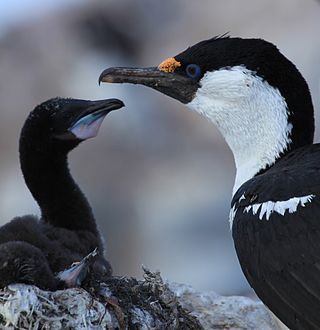
The Arctic Archipelago, also known as the Canadian Arctic Archipelago, is an archipelago lying to the north of the Canadian continental mainland, excluding Greenland and Iceland.

The Leverett Glacier is about 50 nautical miles (90 km) long and 3 to 4 nautical miles wide, flowing from the Antarctic Plateau to the south end of the Ross Ice Shelf through the Queen Maud Mountains. It is an important part of the South Pole Traverse from McMurdo Station to the Admundson–Scott South Pole Station, providing a route for tractors to climb from the ice shelf through the Transantarctic Mountains to the polar plateau.

Montilla is a town and municipality of Spain, located in the autonomous community of Andalusia. As of 2017, the town had a population of 23,209, which makes it the fourth most populated municipality of the Province of Córdoba. It lies 32 miles south of the provincial capital, Córdoba.

Alamedilla is a city located in the province of Granada, Spain. According to the 2005 census (INE), the city has a population of 811 inhabitants.

HMS Niger was a Halcyon-class minesweeper of the Royal Navy. She was launched in 1936 and was sunk during the Second World War. On 5 July 1942, the vessel sailed into a minefield while escorting Convoy QP 13 and struck one of the mines, later sinking with only eight survivors.
Trebolares is a village and rural locality (municipality) in La Pampa Province in Argentina.
Talita is a village and municipality in San Luis Province in central Argentina.

The Brennecke Nunataks are a group of large nunataks on the north side of the head of Beaumont Glacier, to the southwest of the Holmes Hills in south-central Palmer Land. They were mapped by the United States Geological Survey from aerial photographs taken by the U.S. Navy, 1966–69. In association with the names of oceanographers grouped in this area, the group was named by the UK Antarctic Place-Names Committee after Carl Wilhelm A. Brennecke (1875–1924), German oceanographer; member of the staff of Deutsche Seewarte, 1904–24; member of the Second German Antarctic Expedition, 1911–12.
Collins Point is a small but prominent headland 1.4 km (0.87 mi) west-south-west of Fildes Point, on the south side of Port Foster, Deception Island, in the South Shetland Islands of Antarctica. It was charted by a British expedition under Foster, 1828–31. It was named by Lieutenant Commander D.N. Penfold, Royal Navy, following his survey of the island in 1948–49, for Rear Admiral Kenneth Collins of the Hydrographic Department of the Admiralty.
Planet Heights is a series of summits running along an ice-free ridge, extending 24 nautical miles (44 km) in a north-south direction between the southernmost extremity of the LeMay Range and George VI Sound in the east part of Alexander Island, Antarctica. Many landforms and nearby features are named in association with this mountain range; some of these include landforms named after astronomers, satellites, planets and other things related to astrology and astrophysics. The mountain range was first mapped from air photos taken by the Ronne Antarctic Research Expedition (RARE), 1947–48, by Searle of the Falkland Islands Dependencies Survey (FIDS) in 1960. Named by the United Kingdom Antarctic Place-Names Committee (UK-APC) from association with the nearby glaciers named for planets of the Solar System. The only planet that is not featured in any of these glaciers is the planet Earth, as there are no glaciers named "Earth Glacier" and this glacier does not exist.

The Pearl Rocks are a group of rocks covering an area 6 km (3.7 mi) by 4 km (2.5 mi) close to the west coast of Tower Island in the Palmer Archipelago of Antarctica. The name was given by Falkland Islands and Dependencies Aerial Survey Expedition (FIDASE) (1955–57) and is descriptive of the numerous snow-covered rocks in the group.

Gluvreklett Glacier is a glacier flowing northwest between Von Essen Mountain and Terningskarvet Mountain in the Gjelsvik Mountains of Queen Maud Land, Antarctica. It was photographed from the air by the Third German Antarctic Expedition (1938–39). It was mapped by Norwegian cartographers from surveys and photos by the Norwegian–British–Swedish Antarctic Expedition (1949–52) and the Norwegian expedition (1958–59) and named Gluvreklettbreen.

Casasola de Arión is a village in Valladolid, Castile-Leon, Spain. The municipality covers an area of 27.65 square kilometres (10.68 sq mi) and as of 2011 had a population of 314 people.

Plaza Intendente Alvear is a public space in Recoleta, Buenos Aires. It is commonly but mistakenly known as Plaza Francia, as the actual Plaza Francia is located at its side. It faces the Recoleta Cemetery and the cultural center.

The Monumento ecuestre a Carlos María de Alvear located on Plaza Julio de Caro, a landmark in the Recoleta neighbourhood of Buenos Aires, Argentina, and was raised in honor of Carlos María de Alvear (1788-1852).

Chapaleufú Department is a department of Argentina in La Pampa Province. The capital city of the department is Intendente Alvear.

Plaza Francia is a public square in the barrio of Recoleta in Buenos Aires, Argentina. The nearby Plaza Intendente Alvear is commonly but mistakenly known by the same name. It was created by a Municipal Ordinance on October 19, 1909, as part of the changes introduced in the urban landscape on the occasion of the Argentina Centennial. Designed by French landscape architecture Carlos Thays, it is part of a broad set of squares including Plaza Intendente Alvear, Plaza San Martín de Tours, Plaza Juan XXIII, Plaza Ramón J. Cárcano, Plaza Dante and Plaza Rubén Darío, among others.













